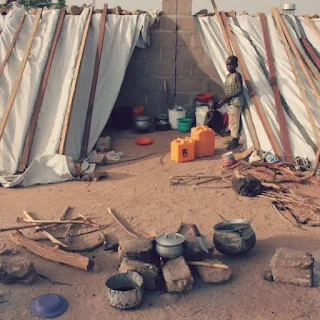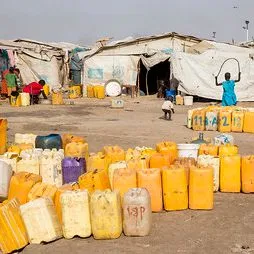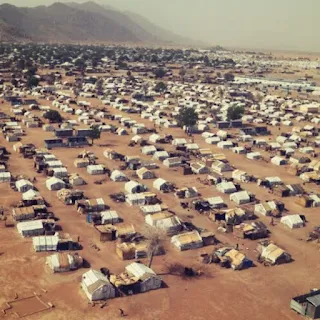Borno State’s capital in Maiduguri northeastern Nigeria had many internally displaced persons (IDP) camps which were home to thousands of people who fled their homes because war had been declared on the everyday people.
Internally Displaced Persons means persons or groups of persons who have been forced or obliged to flee or to leave their homes or places of habitual residence, in particular as a result of or in order to avoid the effects of armed conflict, situations of generalized violence, violations of human rights or natural or human-made disasters, and who have not crossed an internationally recognized State border.
 |
| Life in an IDP camp |
In IDP camps every inch of space counted. Jerrycans and cooking pots were stacked on top of each other and clothes hung from the roof. Living in an IDP camp means you have to start your life from zero, and you may not have a safe place to live once you arrive.
One night in May 2020, Awofaa, a 38-year-old widow was sleeping with her three children inside their village home in herding village in northeast Nigeria's Borno state when they heard gunfire close by. “We had to run immediately, there was no time to take anything but just the clothes on us. Our people were caught off guard by the gunmen. We lived in an open field with nowhere to hide,” she says.
 |
| Jerrycans at an IDP camp |
Once living in a 6x8 tarp tent, a little taller than the size of a refrigerator and wider than the length of a twin or full-size mattress, Awofaa was living with her three children in Maiduguri, Gubio IDP camp afraid to return to her village. She is not prepared to face the challenges to come, both financially and mentally.
On any given day she could be found cleaning their small kitchen or sweeping the path outside their home. However, the Nigerian government decided in January 2022 to close all IDP camps in Maiduguri Nigeria. Since the outbreak of violence Awofaa, like many thousands of other families, have spent years living in IDP camps in Borno State’s capital in Maiduguri Nigeria.
In Borno, Yobe and Adamawa states in northeast Nigeria, conflict is affecting the lives and livelihoods of millions of people. Nigeria's Borno state is the epicenter of an ongoing insurgency of criminal gangs, Boko Haram, Islamic State for West Africa Province and sporadic attackers on motorcycles fighting with Nigeria's armed forces and ordinary citizens leaving over 300,000 dead.
 |
| IDP camps in Borno State’s capital in Maiduguri Nigeria |
Especially in war-torn Borno state, for the past ten years there has been bloody conflict. Violence and insecurity are causing mass movements of people, with over 2.8 million living in camps or host communities within Nigeria and tens of thousands seeking refuge in neighboring countries, including Cameroon, Chad and Niger.
With over 182 million people, Nigeria is the most populated country in Africa and the seventh largest in the world. Thirteen Maiduguri IDP camps were opened seven years ago and disbanded in December 2021 however, seven informal communities or slums remain.
The Nigerian government M.D. Northeast Development Commission states that peace has come to Borno State and conflict has been replaced by non violence therefore IDPs can return to a normal life outside of the camps. Residents of Maiduguri informal communities are officially squatters and do not own, rent or otherwise have lawful permission to use the land, the land belongs to the government of Nigeria.
More links to articles you will find thought provoking.
- Dangerous Erupting Volcanoes of Africa

- Top 20 Largest Countries in Africa

-
What is an African Proverb

- African Water Spirit Mami Wata

-
Ancestors are Guardian Angels



























